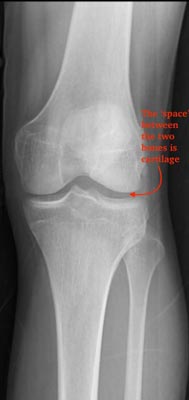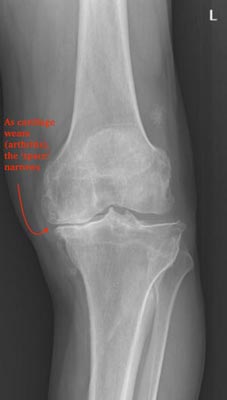Arthritis is a term used to describe a group of conditions that cause inflammation and pain in the joints. It is a common condition that affects millions of people worldwide. There are many different types of arthritis, but some of the most common are osteoarthritis, rheumatoid arthritis, and psoriatic arthritis. Each type of arthritis has its own set of causes, symptoms, and treatment options. It can be a very painful and debilitating condition, but there are many different treatments available that can help manage the symptoms.
Some Examples of Types of Arthritis:
- Osteoarthritis: This type of arthritis is also known as wear and tear arthritis. It is caused by the gradual wearing down of the cartilage that cushions the joints. This can lead to bone rubbing against bone, causing pain, stiffness, and swelling. It is most common in older people, but it can also affect younger individuals.
 (normal knee x-ray)
(normal knee x-ray)
 (arthritic knee x-ray)
(arthritic knee x-ray)
- Rheumatoid arthritis: This is an autoimmune disorder that causes the body's immune system to attack the joints, leading to inflammation and pain. It can affect people of all ages.
- Psoriatic arthritis: This type of arthritis is associated with psoriasis, a skin condition that causes red, scaly patches on the skin. It can cause joint pain, swelling, and stiffness as well as skin rashes and nail changes.
- Gout: Gout is a type of arthritis that occurs when there is too much uric acid in the blood. It can cause sudden, severe attacks of pain, redness, and swelling in the joints.
- Post-traumatic arthritis: Occurs after injury affecting the joint. This can be from an injury that causes a fracture, soft tissue injury (meniscus/labrum/ligament), cartilage damage. It can affect anybody regardless of age. It may not occur right away but it will increase the risk of developing arthritis in the affected joint.
Causes of Arthritis:
The causes of arthritis vary depending on the type of arthritis. Some common causes of arthritis include:
- Genetics: Some types of arthritis, such as rheumatoid arthritis, may be hereditary.
- Age: As we age, the cartilage in our joints may start to wear down, leading to osteoarthritis.
- Injury: Trauma or injury to a joint can increase the risk of developing arthritis.
- Infection: Certain infections can trigger the development of arthritis.
Symptoms of Arthritis:
The symptoms of arthritis may vary depending on the type of arthritis, but some common symptoms include:
- Pain and stiffness in the joints
- Swelling in the joints
- Reduced range of motion in the affected joints
- Warmth and redness in the affected joints
- Fatigue
Treatment Options:
- Medications: There are several medications available to help manage the symptoms of arthritis, including pain relievers, anti-inflammatory drugs, and disease-modifying antirheumatic drugs (DMARDs). Medications can be taken orally or through a joint injection.
- Physical therapy: Physical therapy can help improve joint function, reduce pain, and increase flexibility.
- Surgery: In some cases, surgery may be necessary to repair or replace damaged joints.
- Lifestyle changes: Making lifestyle changes, such as maintaining a healthy weight and engaging in regular exercise, can help manage the symptoms of arthritis.
If you think you may have arthritis, it is important to see a doctor for a proper diagnosis and treatment plan. With the right treatment, it is possible to manage the symptoms of arthritis and maintain an active, healthy lifestyle.

